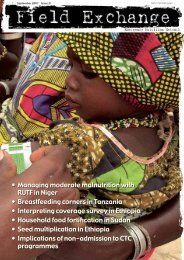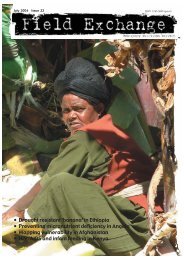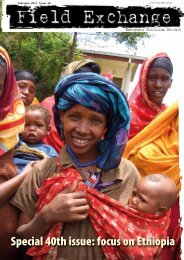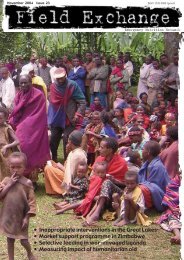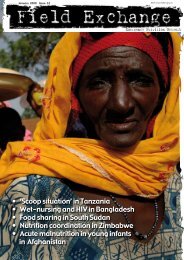Download PDF - Field Exchange - Emergency Nutrition Network
Download PDF - Field Exchange - Emergency Nutrition Network
Download PDF - Field Exchange - Emergency Nutrition Network
Create successful ePaper yourself
Turn your PDF publications into a flip-book with our unique Google optimized e-Paper software.
Research<br />
Humanitarian<br />
Response Index<br />
Eight billion dollars was invested in humanitarian<br />
relief in 2007. The 2008 Humanitarian<br />
Response Index (HRI) Report has been released<br />
by DARA (Development Assistance Research<br />
Associates) 2 . The top five ranked donors (of good<br />
practice, based on Good Humanitarian<br />
Donorship) were Sweden, Norway, Denmark,<br />
Ireland and the European Commission (EC). The<br />
US, which is the largest provider of aid by<br />
volume, ranked 15 out of 23. The US was only<br />
above average in terms of learning and accountability.<br />
The findings from the HRI 2008 point to five<br />
key inter-related areas where wealthy countries<br />
can work to improve the quality, effectiveness<br />
and impact of humanitarian action:<br />
1) Wealthy countries could do more to strengthen<br />
their commitments to provide aid in an impartial,<br />
neutral and independent manner, not based on other<br />
priorities or objectives.<br />
The HRI 2008 findings show that donors are not<br />
always providing aid in an impartial, neutral and<br />
independent manner, or where it is most needed.<br />
Many donors are still biased and influenced by<br />
other factors when it comes to allocating<br />
resources. Too many crises around the world<br />
continue to be a showcase for poor practice,<br />
despite all of the lessons from the past. In many<br />
places, humanitarian assistance continues to be<br />
compromised by wealthy countries’ political,<br />
economic, or security agendas, while elsewhere<br />
other crises are forgotten and neglected.<br />
2) Wealthy countries should contribute to efforts to<br />
improve the quality and use of needs assessments to<br />
determine who needs assistance, where, and of what<br />
kind.<br />
The HRI 2008 findings also suggest that there are<br />
gaps in the area of needs assessments that should<br />
be addressed to ensure that humanitarian assistance<br />
is provided in accordance with needs. The<br />
findings show that there are disparities in the<br />
quality and consistent use of needs assessments.<br />
If humanitarian donorship is truly to be needs<br />
based, donors could contribute to improving<br />
global needs assessments tools with clear transparent<br />
criteria on how to allocate resources at<br />
global level for a more equitable response<br />
between crises. Donors could support their<br />
humanitarian partners in funding and improving<br />
harmonised needs assessments at the country<br />
level. Promoting a continual process of monitoring<br />
the evolving context and assessing how<br />
needs change, as well as making available the<br />
necessary flexible funding to adapt responses<br />
accordingly, are also suggested. Donors could<br />
therefore help promote a more nuanced position<br />
that balances the need for rapid assessments with<br />
the time needed to engage affected populations<br />
in identifying their evolving needs.<br />
3) Wealthy countries could do much more to<br />
harmonise and link relief efforts to early recovery and<br />
longer term development strategies.<br />
The HRI 2008 findings confirm a perennial challenge<br />
in the humanitarian sector – how better to<br />
link relief to recovery and long term development,<br />
and strengthen the resilience of populations<br />
affected by crises. Humanitarian agencies<br />
often struggle to find appropriate means to<br />
achieve a balance between meeting short term<br />
needs and laying the foundation for recovery and<br />
development. The HRI findings show that some<br />
donor policies and procedures can accentuate the<br />
gap between relief, recovery and development,<br />
rather than facilitating more integrated and<br />
harmonised efforts. Similarly donor procedures<br />
can facilitate or impede efforts to engage effectively<br />
local communities in defining and implementing<br />
programmes that meet their needs.<br />
4) Wealthy countries should invest more resources to<br />
strengthen the humanitarian system’s capacity at all<br />
levels.<br />
The HRI 2008 findings indicate that in general,<br />
donors could do much more to prioritise capacity<br />
building in the humanitarian system as an integral<br />
part of their assistance. For example, donors<br />
can do more to fund and prioritise efforts to<br />
strengthen community level and government<br />
capacity to reduce risks, and prepare for and<br />
respond to a crisis. At the same time, there is a<br />
deficit in donor support for strengthening the<br />
capacity of humanitarian organisations that make<br />
up the system. Without investing in areas such as<br />
contingency planning and standing operational<br />
capacity, the system will be hard pressed to deal<br />
with the increasing demands placed on it. Donors<br />
need to approach this issue strategically, and<br />
consider the benefits of investing in building the<br />
capacity of the whole system – not just parts of it<br />
– and do so in a holistic way that encourages<br />
harmonisation and coordination among different<br />
levels. This might include increased support for<br />
the United Nations (UN) humanitarian reform<br />
process to ensure that it is strengthened and<br />
expanded to include other components of the<br />
humanitarian system – including means to integrate<br />
more closely with existing capacities at the<br />
national and local level.<br />
5) Wealthy countries should assume more responsibility<br />
for ensuring implementation of international standards<br />
and good practice, and for improving accountability<br />
and performance in humanitarian action.<br />
Donors could take a more active leadership role<br />
in promoting a shared understanding of good<br />
practice in humanitarian action. The HRI findings<br />
show that there is inconsistent application of the<br />
international laws, principles and standards that<br />
guide and inform effective humanitarian action,<br />
especially those that attempt to ensure that<br />
people affected by crisis receive the support,<br />
protection and assistance they require.<br />
Collectively donors need to renew efforts to<br />
ensure these tools are used consistently, particularly<br />
in conflict situations, where such laws are<br />
often needed most, but most frequently ignored<br />
by some donors themselves.<br />
2<br />
http://www.daraint.org<br />
Gwyneth Cotes, Malawi, 2007<br />
Itayi Nkhono of CAS conducts an interview<br />
to investigate reasons for default.<br />
The CTC<br />
Advisory<br />
Service:<br />
Supporting the<br />
Countrywide<br />
Scale-up of<br />
CTC in Malawi<br />
By Gwyneth<br />
Hogley Cotes<br />
Gwyneth Hogley Cotes holds an MPH<br />
from Tulane University, with a focus on<br />
child health and nutrition. She has<br />
worked with the CTC Advisory Service in<br />
Malawi as a Health and <strong>Nutrition</strong> Advisor<br />
for the last two years. Previous assignments<br />
include coordinating nutrition<br />
programmes in Darfur and supporting<br />
immunisation programmes in Ghana.<br />
The author would like to thank Kate<br />
Golden of Concern Worldwide, Tapiwa<br />
Ngulube of the Malawi Ministry of Health,<br />
and Roger Mathisen of UNICEF for<br />
reviewing and contributing to this article.<br />
(HRI) Summary of report 1 1<br />
http://www.hri.daraint.org/what_is_hri/hri_2008_overall<br />
17



